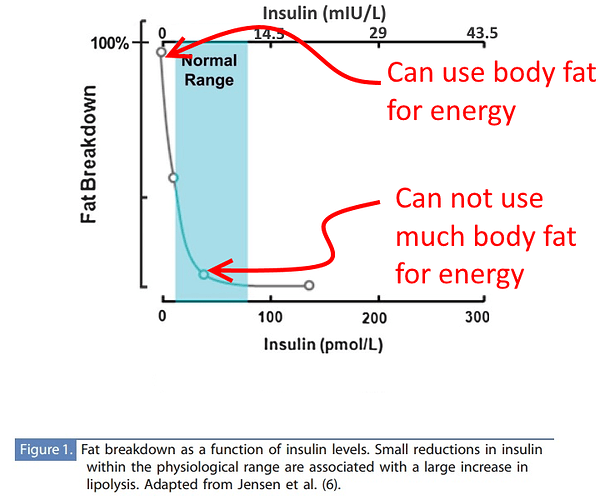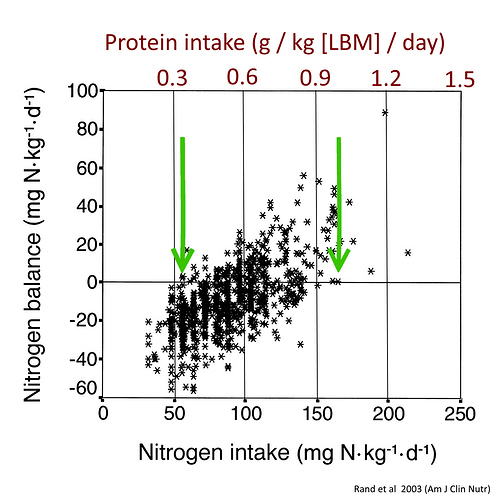The author makes 4 fundamental errors.
An error in the biochemistry, an error of terminology, a classic logic error, and a prejudice.
#Biochemistry - Insulin’s first job
The error of biochemistry is the assumption that all people have equal and adequate access to energy from body fat. People who make this mistake understand instinctively that a person with less body fat has to eat more fat, and therefore they reason that it must follow that a person with a lot of body fat just has to eat less fat - and by extension if they don’t lose weight then they must keep restricting dietary fat more and more until they lose weight. It’s a simplistic motto - fat is your lever. It’s also wrong for more than half the population, and an oversimplification that obscures the mechanism for the remainder.
The mistake is to not understand that the primary role of insulin is to inhibit the release of free fatty acids (Energy) from adipose tissue (Fat cells). When insulin goes up, the energy coming from your body fat goes down - when Insulin goes down, energy coming from your body fat goes up.
Some people can’t get insulin down low enough no matter what they eat - so when they pull that fat lever their metabolism slows to a crawl and they recruit energy from alternate sources - ie: burning lean mass for energy.
The other mistake is the assumption that only dietary carbohydrates raise insulin, and if you restrict carbohydrates that insulin must go low enough for the inhibition of lipolysis to come off. But the fact is that not everyone has a fasted insulin below the level of inhibition of fat cells releasing their cargo.
Also not everyone releases adequate first phase insulin, and often ends up with second phase insulin release that lasts for 6 hours after a meal, instead of the 2-3 it should. So for these people multiple small meals is a dumb idea, and more protein than is required for lean tissue maintenance is a dumb idea.
Every type 2 diabetic, even those with ideal glycostasis has likely battled with this. If you are young enough and have caught type 2 diabetes early enough you might after a few years of good glucose be able to lower your insulin sufficiently. If you have been diabetic longer it could take a decade of keeping calm and keto’ing on to totally recycle your adipose tissue and, for some it may never happen.
#Terminology - Ad Libitum
The problem with terminology is a misunderstanding of the term Ad libitum. A well formulated ketogenic diet is, and has always been an “Ad Libitum” diet which is a Latin term that means “without restraint.”. This diet limits carbs and protein to their functional minimums while getting essential nutrition, and gets energy from fat without restraint. Ad libitum means that you let hunger and satiation determine adequate fuel intake - so your body determines if it will get energy from body fat, or it will make you hungrier so you add fat to your plate.
Before adapting your hunger/satiation signals may have you eating a lot of fat which will ramp up the pathways of metabolism for fat, once adapted you spontaneously decrease your intake of fat when you have access to body fat, and when you no longer do you spontaneously increase the amount of dietary fat. That is what the term Ad Libitum means. If you are doing a well formulated ketogenic properly you can not by definition over eat fat - because you stop when full, and only eat again when hungry.
I’m pretty sure that the diet that group promotes is not a well formulated ketogenic diet, and they have cherry picked the elements they like from Drs Phinney and Volek and pretended the remainder don’t exist. Perhaps that diet should be called the “Fat lever formulated” ketogenic diet instead of the Well formulated ketogenic diet.
#We’re all the same snowflake
The logic error is the one that almost every dieter, who hangs out their shingle as a coach, falls into. The assumption that what worked for them must therefore work for everyone.
The natural corollary of this is that people who don’t see the same results must have something wrong with them; not enough discipline, laziness, gluttony, sloth. It’s natural for human beings with egos to fall into that trap, and healthy for them to be called out on it.
Y’know I’ll bet the average fasted insulin for people who are able to get the “fat lever” formulation to work is under 13 mIU/L.
#Strawmen as far as the eye can see
This leads into the final error; Prejudice, the assumption that a great mass of potential clients out there that that need coaching are doing it wrong, chugging butter, chasing ketones, eating too much fat, not eating enough protein, doing too much cardio and not enough weight bearing exercise.
The reality is most people doing a ketogenic diet don’t know their ketones, and from the remainder who do - most lose interest when they are over 0.5 mmol/l. Personally I suspect the only useful diagnostic level of ketones is > 0. Sure there are people who compete to get the highest ketone reading, there are also people who compete to dead lift the most weight - it doesn’t mean everyone lifting weights is.
Also most people don’t live on a high butter diet, or get their energy from mostly fat bombs. Almost no-one on a ketogenic diet is eating protein below 1g/kg LBM — and that is the HIGH outlier for nitrogen balance.
So all this hand wringing about low protein butter chugging ketone chasers is a strawman.
It’s evidently a commercial decision to peel potential new clients from other coaches, but I suspect that will turn out to be a 2 edged sword. Every time someone posts a meme about “fat bombs being already on your belly” or some straw man that “everyone in the butter keto groups thinks” or some parable about how a ketogenic diet should be a high protein and not a high fat one … tens of thousands of people who have successfully reversed metabolic disease or gained control over their appetite and body weight eating Ad Libitum fat as they pass by make a mental note to themselves “Y’know, screw that a$$hole”… and eventually everyone thinks it.
We don’t coach, we don’t care if people in this forum are coached elsewhere and have success meeting their goals … if “fat is a lever” works for you that is awesome.



